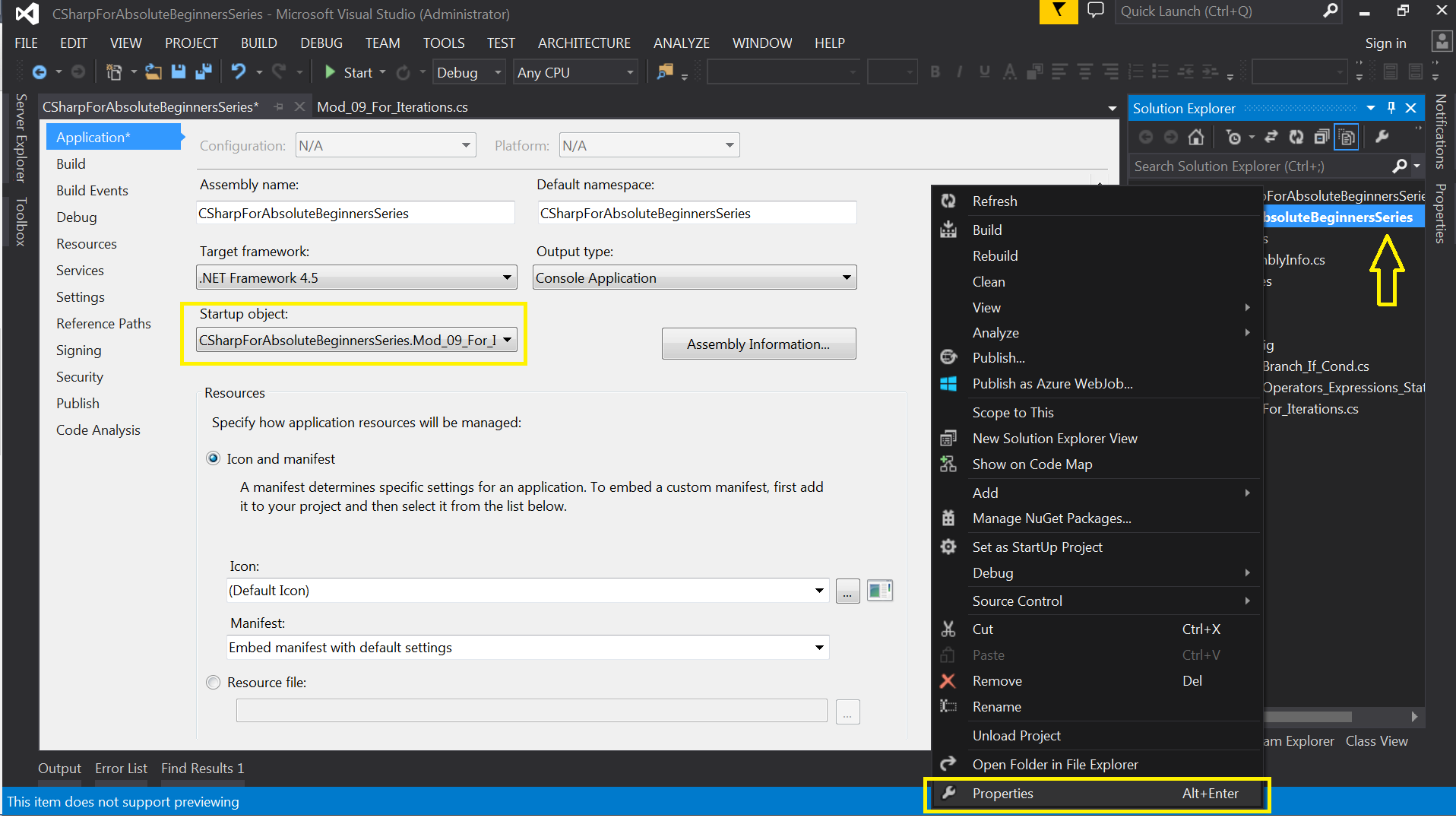Per the code below, I am getting the following message. I am fairly certain "why" I am getting it, I just don't know how to rearrange the code to move/remove/replace one of the error causing statements.
"Compile with /main to specify the type that contains the entry point."
There is a bunch of code in there under "static void Main(string[] args)", that I got from http://support.microsoft.com/kb/816112 forthe purpose of getting the ID from auto-increment, so i can have it auto increment, when the rest of the code populates the Access database. Any help is appreciated. And suggestions to get the results with easier code are welcome, as well!
namespace WindowsFormsApplication1
{
public partial class Form1 : Form
{
OleDbConnection vcon = new OleDbConnection(@"Provider=Microsoft.ACE.OLEDB.12.0;data source=C:\Hazardous Materials\KinneyDatabase.accdb");
public Form1()
{
InitializeComponent();
}
private void Form1_Load(object sender, EventArgs e)
{
vcon.Open();
try
{
StreamReader sr = new StreamReader(@"C:\Hazardous Materials\cities.txt");
string line = sr.ReadLine();
StreamReader sr2 = new StreamReader(@"C:\Hazardous Materials\drugs.txt");
string line2 = sr2.ReadLine();
StreamReader sr3 = new StreamReader(@"C:\Hazardous Materials\strengths.txt");
string line3 = sr3.ReadLine();
while (line != null)
{
comboBox1.Items.Add(line);
line = sr.ReadLine();
}
while (line2 != null)
{
comboBox2.Items.Add(line2);
line2 = sr2.ReadLine();
}
while (line3 != null)
{
comboBox3.Items.Add(line3);
line3 = sr3.ReadLine();
}
textBox2.Text = "Date";
}
catch (System.Exception ex)
{
MessageBox.Show("Error: " + ex.Message);
}
}
private static OleDbCommand cmdGetIdentity;
[STAThread]
static void Main(string[] args)
{
// Open Connection
OleDbConnection vcon = new OleDbConnection(@"Provider=Microsoft.ACE.OLEDB.12.0;data source=C:\Hazardous Materials\KinneyDatabase.accdb");
vcon.Open();
// If the test table does not exist then create the Table
string strSQL;
strSQL = "CREATE TABLE AutoIncrementTest " +
"(ID int identity, Description varchar(40), " +
"CONSTRAINT AutoIncrementTest_PrimaryKey PRIMARY KEY (ID))";
// Command for Creating Table
OleDbCommand cmdJetDB = new OleDbCommand(strSQL, vcon);
cmdJetDB.ExecuteNonQuery();
// Create a DataAdaptor With Insert Command For inserting records
OleDbDataAdapter oleDa = new OleDbDataAdapter("Select * from AutoIncrementTest", vcon);
// Command to Insert Records
OleDbCommand cmdInsert = new OleDbCommand();
cmdInsert.CommandText = "INSERT INTO AutoIncrementTest (Description) VALUES (?)";
cmdInsert.Connection = vcon;
cmdInsert.Parameters.Add(new OleDbParameter("Description", OleDbType.VarChar, 40, "Description"));
oleDa.InsertCommand = cmdInsert;
// Create a DataTable
DataTable dtTest = new DataTable();
oleDa.Fill(dtTest);
DataRow drTest;
// Add Rows to the Table
drTest = dtTest.NewRow();
drTest["Description"] = "This is a Test Row 1";
dtTest.Rows.Add(drTest);
drTest = dtTest.NewRow();
drTest["Description"] = "This is a Test Row 2";
dtTest.Rows.Add(drTest);
// Create another Command to get IDENTITY Value
cmdGetIdentity = new OleDbCommand();
cmdGetIdentity.CommandText = "SELECT @@IDENTITY";
cmdGetIdentity.Connection = vcon;
// Delegate for Handling RowUpdated event
oleDa.RowUpdated += new OleDbRowUpdatedEventHandler(HandleRowUpdated);
// Update the Data
oleDa.Update(dtTest);
// Drop the table
cmdJetDB.CommandText = "DROP TABLE AutoIncrementTest";
cmdJetDB.ExecuteNonQuery();
// Release the Resources
cmdGetIdentity = null;
cmdInsert = null;
cmdJetDB = null;
vcon.Close();
vcon = null;
}
// Event Handler for RowUpdated Event
private static void HandleRowUpdated(object sender, OleDbRowUpdatedEventArgs e)
{
if (e.Status == UpdateStatus.Continue && e.StatementType == StatementType.Insert )
{
// Get the Identity column value
e.Row["ID"] = Int32.Parse(cmdGetIdentity.ExecuteScalar().ToString());
System.Diagnostics.Debug.WriteLine(e.Row["ID"]);
e.Row.AcceptChanges();
}
}
private void button1_Click(object sender, EventArgs e)
{
if (comboBox1.SelectedIndex <= 0)
{
MessageBox.Show("All fields must be filled out to submit the form");
}
else if (comboBox2.SelectedIndex <= 0)
{
MessageBox.Show("All fields must be filled out to submit the form");
}
string addRemove = "";
//string toFrom = "";
if (radioButton1.Checked)
{
addRemove = "add";
//toFrom = "to";
}
else if (radioButton2.Checked)
{
addRemove = "remove";
//toFrom = "from";
}
float mgTotal = (float.Parse(textBox1.Text) * float.Parse(comboBox3.Text));
MessageBox.Show("You have entered the following information: \n\n"
+ "\n" + "Location: " + float.Parse(comboBox1.Text)
+ "\n" + "Medication: " + comboBox2.Text
+ "\n" + "Quantity " + textBox2.Text
+ "\n" + "Strength " + float.Parse(comboBox3.Text)
+ "\n" + "Initials: " + textBox3.Text
+ "\n" + "Add or Remove: " + addRemove
+ "\n" + "Date: " + textBox2.Text);
}
private void button2_Click(object sender, EventArgs e)
{
new Form2().Show();
}
private void button3_Click(object sender, EventArgs e)
{
Application.Exit();
}
private void toolStripMenuItem1_Click(object sender, EventArgs e)
{
MessageBox.Show("Produced for use by HealthDirect© \n Scripted by Geoff Bertollini. March 2012");
}
private void comboBox1_SelectedIndexChanged(object sender, EventArgs e)
{
}
private void comboBox2_SelectedIndexChanged(object sender, EventArgs e)
{
comboBox3.SelectedIndex = comboBox2.SelectedIndex;
}
private void textBox2_TextChanged(object sender, EventArgs e)
{
var date = DateTime.Now.ToString("MM/dd/yyyy");
textBox2.Text = date;
}
private void label4_Click_1(object sender, EventArgs e)
{
}
private void exitToolStripMenuItem1_Click(object sender, EventArgs e)
{
Application.Exit();
}
private void button4_Click(object sender, EventArgs e)
{
string addRemove = "";
string toFrom = "";
if (radioButton1.Checked)
{
addRemove = "added";
toFrom = "to";
}
else if (radioButton2.Checked)
{
addRemove = "removed";
toFrom = "from";
}
float mgTotal = (float.Parse(textBox1.Text) * float.Parse(comboBox3.Text));
string vsql = string.Format("insert into Log values " +
"('{0}','{1}',{2},{3},'{4}',#{5}#,'{6}','{7}')",
comboBox1.Text,
comboBox2.Text,
float.Parse(textBox1.Text),
float.Parse(comboBox3.Text),
textBox3.Text,
textBox2.Text,
addRemove,
"1"
);
OleDbCommand vcom = new OleDbCommand(vsql, vcon);
vcom.ExecuteNonQuery();
MessageBox.Show("Date: " + textBox2.Text + "\n Initials: " + textBox3.Text
+ "\n" + "You have " + addRemove + " " + mgTotal + " milligrams " + "\n"
+ "of " + comboBox2.Text + "\n" + toFrom + " the inventory of \n" + comboBox1.Text);
vcom.Dispose();
}
}
}

